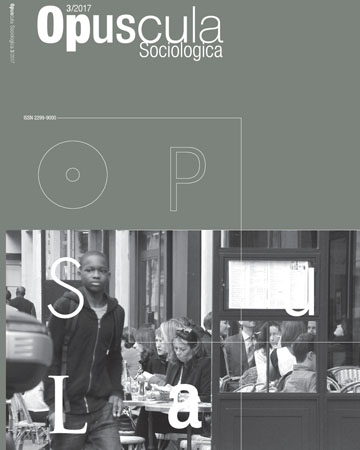
ISSN: 2299-9000
eISSN: 2353-2882
OAI
DOI: 10.18276/os.2017.3-01


Issue archive /
nr 3/2017
Meandry etnicznych i narodowych identyfkacji
(The Intricacies of Ethnic and National Identifcation)
| Authors: | Renata Suchocka |
| Keywords: | national identification ethnic identification social identity complex identification immigrants |
| Data publikacji całości: | 2017 |
| Page range: | 14 (5-18) |
Abstract
The aim of this study is to draw attention to the intricacies of identifcation in the societies in which identifcation is increasingly becoming a matter of choice, not “heredity”. The subject of the discussion includes the complex identifcation occurring in multinational and multi-ethnic countries, different identities of their residents and citizens, immigrants, and particularly their descendants, including double or cosmopolitan identifcations, constructed and not “transferred” by the ancestors. What do declarations, treated as relating to the national (ethnic) identifcation, actually mean? Do they inform of the identifcation with the nation, homeland or the state? The relations between the different types of national and
(or) ethnic identifcation can determine people’s attitudes towards the state of residence, the nation and the country of settlement and origin (the country of their ancestors). The knowledge of these relationships is especially important for interpreting the complex identifcations being declared, and for understanding the national conversion.
Download file
Article file
Bibliography
| 1. | Beck, U. (2005). Władza i przeciwwładza w epoce globalnej. Nowa ekonomia polityki światowej. Warszawa: Scholar. |
| 2. | Beck, U., Grande, E. (2009). Europa kosmopolityczna. Społeczeństwo i polityka w drugiej nowoczesności. Warszawa: Scholar. |
| 3. | Brubaker, R. (1998). Nacjonalizm inaczej. Struktura narodowa i kwestie narodowe w nowej Europie. Kraków: Wydawnictwo Naukowe PWN. |
| 4. | Erikson, E.H. (2000). Dzieciństwo i społeczeństwo. Poznań: Dom Wydawniczy Rebis. |
| 5. | Gudaszewski, G. (2015). Struktura narodowo-etniczna, językowa i wyznaniowa ludności Polski. Narodowy Spis Powszechny Ludności i Mieszkań 2011. Warszawa: GUS. Pobrano z: http://stat.gov.pl/fles/gfx/portalinformacyjny/pl/defaultaktualnosci/5670/22/1/1/struktura_narodowo-etniczna.pdf (14.09.2015). |
| 6. | Gupta, A., Ferguson, J. (2004). Poza „kulturę”: przestrzeń, tożsamość i polityka różnicy. W: M. Kempy, E. Nowicka (red.), Badanie kultury. Elementy teorii antropologicznej. Kontynuacje (267–283). Warszawa: Wydawnictwo Naukowe PWN. |
| 7. | Hall, S. (1992). New Ethnicities. W: J. Donald, A. Rattansi (ed.), “Race”, Culture and Difference (252–259). London: Sage Publications. |
| 8. | Kłoskowska, A. (1992). Tożsamość i identyfkacja narodowa w perspektywie historycznej i psychologicznej. Kultura i Społeczeństwo, 1, 131–141. |
| 9. | Kłoskowska, A. (1996). Kultury narodowe u korzeni. Warszawa: Wydawnictwo Naukowe PWN. |
| 10. | Machaj, I. (2005). Społeczno-kulturowe konteksty tożsamości mieszkańców wschodniego i zachodniego pogranicza Polski. Warszawa: Wydawnictwo Naukowe Scholar. |
| 11. | Merton, R.K. (1982). Teoria socjologiczna i struktura społeczna. Warszawa: PWN. |
| 12. | Modood, T. (2014). Multikulturalizm. Poznań: Wydawnictwo Nauka i Innowacje. |
| 13. | Modood, T., Berthoud, R., Lakey, J., Nazroo, J., Smith, P., Virdee, S., Beishon, S. (1997). Ethnic Minorities in Britain: Diversity and Disadventage. London: Policy Studies Institute. |
| 14. | Ossowski, S. (1984). Analiza socjologiczna pojęcia ojczyzny. Dzieła. T. III. Warszawa: PWN. |
| 15. | Parsons, T. (1972). Szkice z teorii socjologicznej. Warszawa: PWN. |
| 16. | Raciborski, J. (2011). Obywatelstwo w perspektywie socjologicznej. Warszawa: Wydawnictwo Naukowe PWN. |
| 17. | Roy, O. (2004). Globalised Islam. London: C. Hurst. |
| 18. | Roy, O. (2005). A Clash of Cultures or a Debate on Europe’s Values. ISIM (International Institute for the Study of Islam in the Modern World) Review. Spring, 6–7. |
| 19. | Said, E.W. (1979). Zionism from the Standpoints of the Victims. Social Text, 1 (1), 7–58. |
| 20. | Suchocka, R. (2003). Widnokrąg społeczny a przekraczanie granic. W: M. Zielińska (red.), Transgraniczność w perspektywie socjologicznej. Teorie, studia, interpretacje (83–98). Zielona Góra: Lubuskie Towarzystwo Naukowe. |
| 21. | Suchocka, R. (2014). Mieszkańcy Europy, Europejczycy i ich widnokręgi społeczne. Poznań: Wydawnictwo Naukowe UAM. |
| 22. | Szacka, B. (2008). Wprowadzenie do socjologii. Warszawa: Ofcyna Naukowa. |
| 23. | Tajfej, H. (1972). La catégorisation sociale. W: S. Moscovici (red.), Introduction à la psychologie sociale. Vol. 1, 272–302. Paris: Larousse. |
| 24. | Tajfel, H. (1982). Social Identity and Intergroup Relations. Cambridge: Cambridge University Press. |
| 25. | Turner, J.C. (1992). Ku poznawczej redefnicji pojęcia „grupa społeczna”. W: J. Szmatka (red.), Elementy mikrosocjologii. Wybór tekstów. Cz. II (81–109). Kraków: Wydawnictwo UJ. |
| 26. | Waldenberg, M. (2000). Narody zależne i mniejszości narodowe w Europie Środkowo-Wschodniej. Warszawa: Ofcyna Naukowa. |
| 27. | Young, D. (1937). American Minority Peoples. New York: Harper & Brot. B. Readings on Specifc Nationality Groups. |